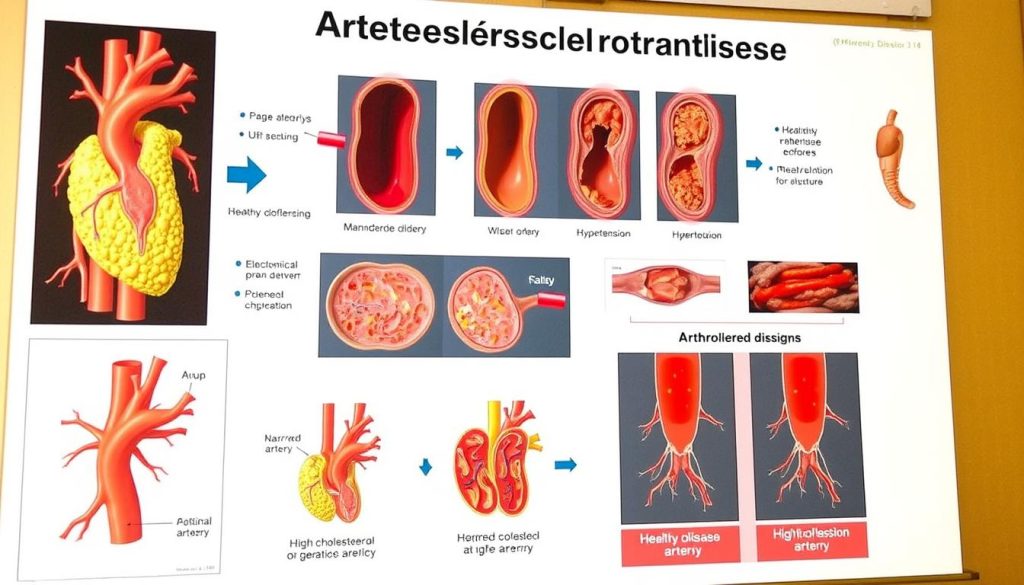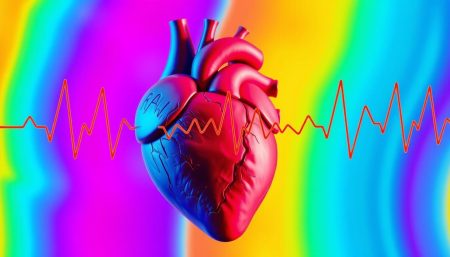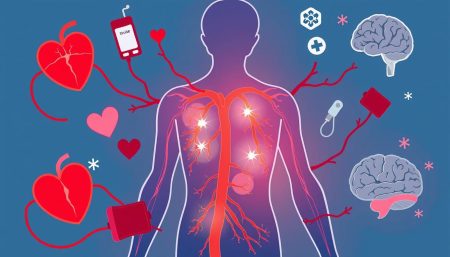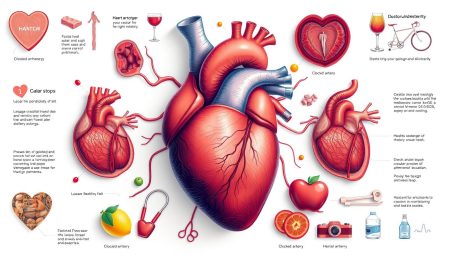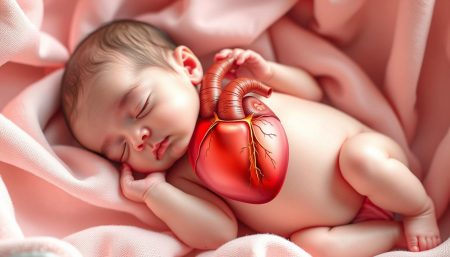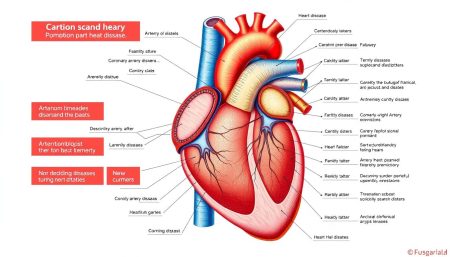Arteriosclerotic cardiovascular disease (ASCVD) is a serious heart condition that affects millions of Americans. This guide sheds light on ASCVD, its impact on heart health, and key cardiovascular risk factors.
ASCVD occurs when arteries harden and narrow over time. This process restricts blood flow, increasing the risk of heart disease and other cardiovascular problems. Understanding ASCVD is key to keeping your heart healthy and avoiding serious complications.
In this guide, we’ll dive into the causes, symptoms, and treatment options for arteriosclerotic cardiovascular disease. We’ll also share effective ways to lower your risk and boost your heart health.
Understanding Arteriosclerotic Cardiovascular Disease: An Overview
Arteriosclerotic cardiovascular disease is a serious condition that affects the arteries. It happens when the walls of the arteries harden and narrow. This makes it hard for blood to flow around the body. If not treated, it can cause severe health problems.
The Role of Arterial Wall Hardening
Arterial wall hardening is a major part of arteriosclerotic cardiovascular disease. As we get older, our arteries naturally lose their flexibility. This gets worse with a bad diet, not exercising, and smoking. The hard arteries can’t open up and close with each heartbeat, making blood flow less efficient.
Difference Between Arteriosclerosis and Atherosclerosis
Arteriosclerosis and atherosclerosis are often confused with each other, but they are different:
| Arteriosclerosis | Atherosclerosis |
|---|---|
| General hardening of arteries | Specific type of arteriosclerosis |
| Loss of arterial elasticity | Buildup of plaque in artery walls |
| Affects all arteries | Primarily affects large and medium-sized arteries |
Impact on Blood Flow and Circulation
Narrowed arteries from plaque buildup really mess with blood flow. This can cause chest pain, shortness of breath, and raise the risk of heart attacks or strokes. Knowing how this works is key to preventing and treating arteriosclerotic cardiovascular disease.
What Is Arteriosclerotic Cardiovascular Disease and Its Mechanisms
Arteriosclerotic cardiovascular disease (ASCVD) is a serious health issue that affects the heart and blood vessels. It happens when arteries become hard and narrow because of plaque buildup. This buildup is called atherosclerosis, which is the main cause of ASCVD.
The disease starts when cholesterol and other substances gather in artery walls. Over time, this forms plaque, which narrows the arteries and cuts down blood flow. This means organs and tissues get less oxygen and nutrients, causing health problems.
Coronary artery disease is a type of ASCVD that affects the heart’s blood supply. When plaque builds up in coronary arteries, it can cause chest pain, shortness of breath, or even heart attacks.
“Understanding what arteriosclerotic cardiovascular disease is and how it develops is key for prevention and early treatment.”
ASCVD can affect many parts of the body:
- Heart: Reduced blood flow can lead to heart attacks
- Brain: Restricted blood supply may cause strokes
- Limbs: Poor circulation can result in peripheral artery disease
- Kidneys: Impaired blood flow may lead to kidney dysfunction
Knowing how ASCVD works is vital for finding ways to prevent and treat it. By tackling risk factors and living a healthy lifestyle, people can lower their risk of getting this serious heart condition.
Common Risk Factors for Developing ASCVD
It’s important to know about cardiovascular risk factors to prevent and manage arteriosclerotic cardiovascular disease (ASCVD). These factors fall into three main groups: modifiable, non-modifiable, and lifestyle-related.
Modifiable Risk Factors
These are factors you can change through medical help or lifestyle changes:
- Hypertension (high blood pressure)
- High cholesterol levels
- Diabetes
- Obesity
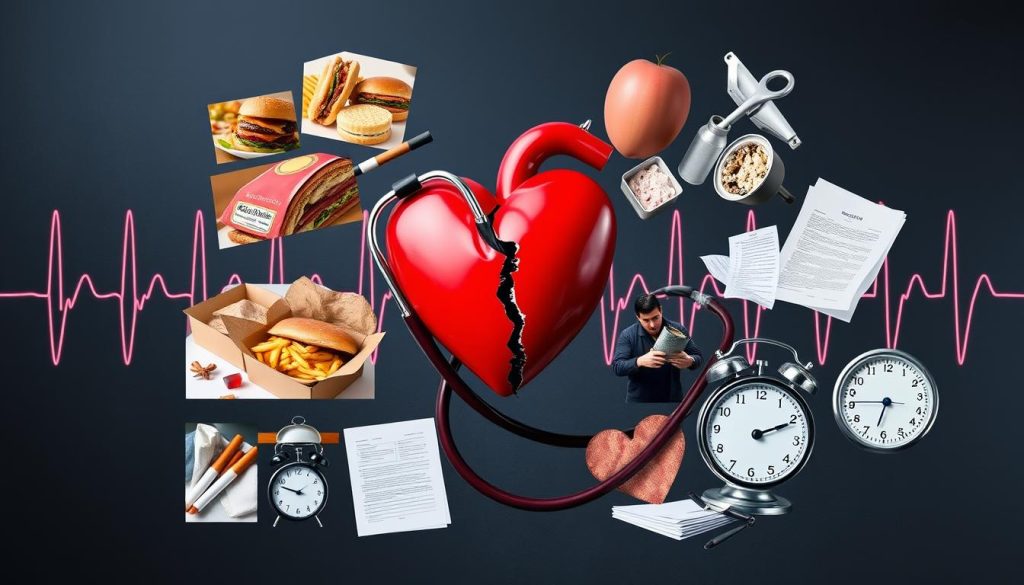
Non-modifiable Risk Factors
These are factors you can’t change:
- Age (risk increases with age)
- Gender (men are at higher risk)
- Family history of heart disease
- Ethnicity
Lifestyle-Related Risk Factors
These factors depend on your choices and habits:
- Smoking
- Physical inactivity
- Unhealthy diet
- Excessive alcohol consumption
- Chronic stress
| Risk Factor | Impact on ASCVD Risk | Management Strategy |
|---|---|---|
| Hypertension | High | Medication, lifestyle changes |
| High cholesterol levels | High | Diet, medication |
| Smoking | Very High | Cessation programs |
| Physical inactivity | Moderate | Regular exercise |
By tackling modifiable and lifestyle-related risk factors, you can lower your ASCVD risk. Regular health checks to watch your blood pressure and cholesterol are key. This helps catch and manage these risks early.
Signs and Symptoms of Arterial Disease
It’s important to know the signs of arterial disease early. Heart disease and coronary artery disease show symptoms that should not be ignored.
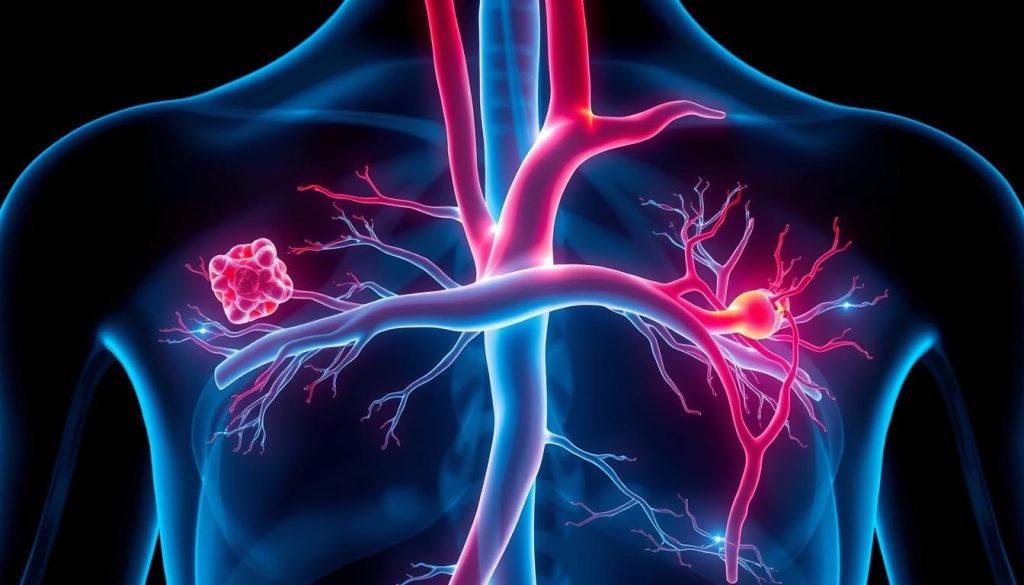
Chest pain, or angina, is a common sign of coronary artery disease. This pain can feel like pressure or squeezing in the chest. It often happens during exercise or when feeling stressed.
Shortness of breath is another key symptom. People with heart disease might get out of breath easily. This shows the heart is not pumping blood well.
Fatigue and weakness are often overlooked. Feeling unusually tired or weak, even with simple tasks, could mean heart disease.
“Listen to your body. Unexplained fatigue or changes in your exercise tolerance could be your heart trying to tell you something.”
Other signs to watch for include:
- Irregular heartbeat
- Swelling in the legs, ankles, or feet
- Cold sweats
- Nausea or vomiting
Symptoms can differ from person to person. Women, for example, may have different signs of heart disease than men.
| Common Symptoms | Less Common Symptoms |
|---|---|
| Chest pain | Jaw or throat pain |
| Shortness of breath | Back or arm pain |
| Fatigue | Nausea or vomiting |
If you notice any of these symptoms, seek medical help right away. Early treatment of coronary artery disease can greatly improve your life.
Diagnosis Methods and Testing Procedures
Doctors use many ways to find arteriosclerotic cardiovascular disease. They check for risk factors and see how much damage is in the arteries.
Physical Examination Techniques
Doctors check blood pressure and listen to heart sounds during a physical exam. They also look for signs of poor circulation. They feel pulses in different parts of the body to find any issues with blood flow.
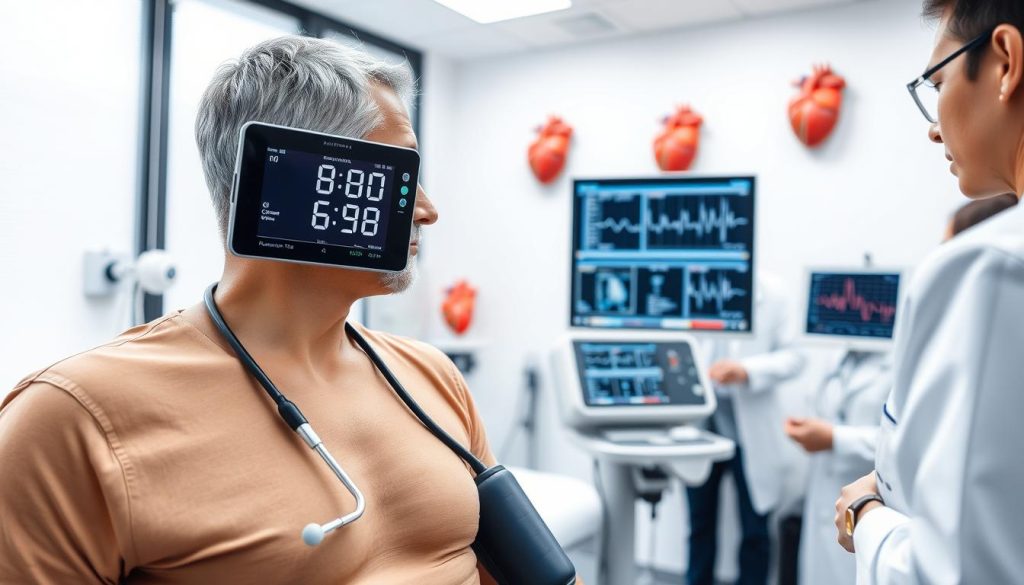
Laboratory Tests and Imaging
Blood tests are key in checking heart health. They measure cholesterol levels, blood sugar, and other markers for heart disease risk. Tests like CT scans and angiograms give detailed views of the arteries and heart.
| Test | Purpose | What It Measures |
|---|---|---|
| Lipid Panel | Assess cholesterol levels | LDL, HDL, Triglycerides |
| CT Angiography | Visualize arteries | Plaque buildup, narrowing |
| Stress Test | Evaluate heart function | Blood flow during exercise |
Specialized Cardiovascular Assessments
Tests like coronary calcium scoring can spot early signs of artery hardening. Echocardiograms use sound waves to show the heart’s moving pictures. This helps doctors find problems with heart valves and muscle function.
“Early detection through these diagnostic methods is key to managing cardiovascular risk factors and preventing serious complications.”
Treatment Options and Medical Interventions
Managing arteriosclerotic cardiovascular disease requires a detailed plan. Doctors create treatment plans that include medicines, lifestyle changes, and sometimes surgery. The aim is to slow the disease and improve life quality.
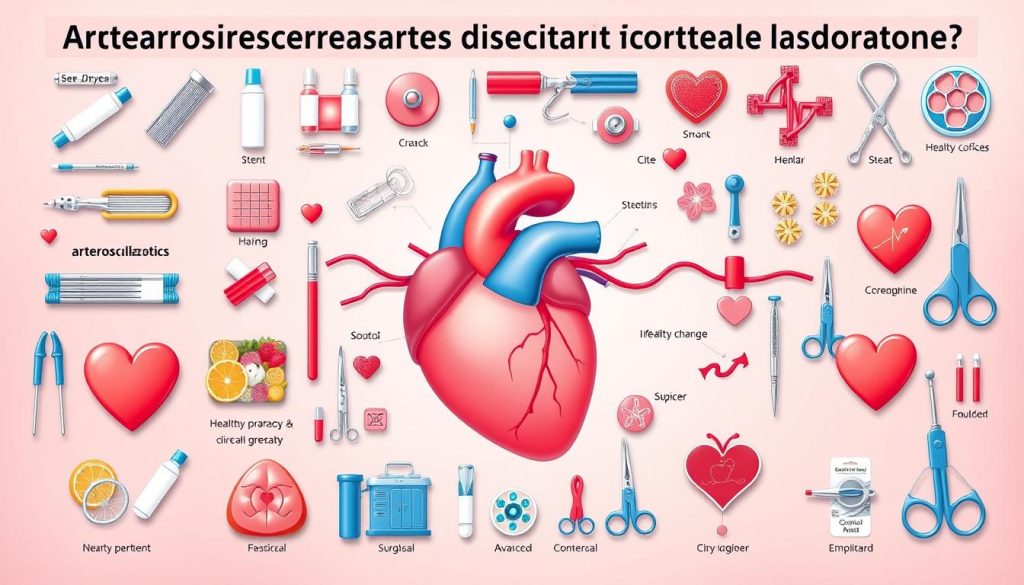
Medicines are key in treating ASCVD. Statins help lower cholesterol and reduce blood vessel inflammation. Blood pressure meds control high blood pressure, a major risk factor. Antiplatelet drugs prevent blood clots.
Lifestyle changes are also critical for success. These include:
- Eating a heart-healthy diet with less saturated fats and more fruits, veggies, and whole grains
- Doing at least 150 minutes of moderate exercise each week
- Quitting smoking and drinking less alcohol
- Managing stress with relaxation techniques or therapy
In severe cases, surgery might be needed. Angioplasty or bypass surgery can open blocked arteries. These surgeries are for those who haven’t improved with other treatments.
Regular health check-ups and cholesterol monitoring are important for managing the disease. By using medicines and lifestyle changes together, many patients control their ASCVD and lower their risk of serious problems.
Preventive Measures and Lifestyle Modifications
It’s important to prevent arteriosclerotic cardiovascular disease to keep your heart healthy. By making lifestyle changes, you can lower your risk of heart disease. Here are some ways to protect your heart and blood vessels.
Diet and Nutrition Guidelines
Eating right is key to a healthy heart. Focus on:
- Fruits and vegetables
- Whole grains
- Lean proteins
- Healthy fats like olive oil and avocados
Try to eat less of saturated fats, trans fats, and sodium. This helps keep your arteries in good shape.

Exercise Recommendations
Exercise is essential for heart health. Aim for:
- 150 minutes of moderate-intensity aerobic exercise weekly
- Strength training exercises 2-3 times per week
- Daily walks or other low-impact activities
Stress Management Techniques
Too much stress can harm your heart. Try these stress-reducing activities:
- Practice mindfulness meditation
- Engage in deep breathing exercises
- Pursue hobbies or activities you enjoy
- Seek support from friends, family, or a therapist
By making these lifestyle changes, you can control your heart health. This reduces your risk of ASCVD.
Managing Cholesterol and Blood Pressure Levels
Keeping cholesterol and blood pressure levels in check is vital for heart health. These factors are key in atherosclerosis, which can cause serious heart problems. Let’s look at ways to manage these important health markers.
Managing cholesterol involves lifestyle changes and, if necessary, medication. Eating a diet full of fruits, vegetables, and whole grains can lower bad cholesterol. Regular exercise, like brisk walking or cycling, also increases good cholesterol.
To control blood pressure, it’s important to reduce salt intake. Try to stay under 2,300 mg of sodium daily. Stress management, like meditation or yoga, can also help keep blood pressure in check.
“Small changes in diet and exercise can make a big difference in managing cholesterol and blood pressure.”
Here’s a simple guide to help you manage these important health markers:
| Factor | Target Range | Management Strategies |
|---|---|---|
| Total Cholesterol | Below 200 mg/dL | Limit saturated fats, increase fiber intake |
| LDL Cholesterol | Below 100 mg/dL | Eat more nuts, avocados, and olive oil |
| HDL Cholesterol | Above 60 mg/dL | Exercise regularly, quit smoking |
| Blood Pressure | Below 120/80 mmHg | Reduce salt, maintain healthy weight |
Remember, managing cholesterol and blood pressure is a continuous effort. Regular doctor visits are key to tracking your progress and making any necessary changes to your plan.
Complications and Long-term Health Effects
Arteriosclerotic cardiovascular disease (ASCVD) can cause serious health problems if not treated. Knowing these issues helps manage the condition better.
Heart Attack and Stroke Risks
ASCVD raises the risk of heart disease and stroke. Narrow arteries limit blood flow to important organs. This can lead to heart attacks or strokes.
Regular health checks and lifestyle changes are key to lowering these risks.
Organ Damage Prevention
ASCVD can harm organs like the kidneys, liver, and limbs. Reduced blood supply is the main cause. To avoid organ damage:
- Keep blood pressure and cholesterol in check
- Eat a diet full of fruits and veggies
- Stay active to boost blood flow
- Stop smoking to protect arteries
Quality of Life Impact
ASCVD can change daily life. Symptoms like chest pain or shortness of breath may limit activities. But, with the right care, you can live well.
Working with your healthcare team and sticking to treatment plans is vital. This helps manage coronary artery disease and other ASCVD types.
“With proper care and lifestyle adjustments, many people with ASCVD lead fulfilling lives. It’s about taking control of your health and making positive changes.”
Understanding these long-term effects helps take action. Regular monitoring and following treatment plans are essential. They keep your heart and overall health in good shape.
Latest Research and Medical Advancements
The field of arteriosclerotic cardiovascular disease is changing fast. Researchers are finding new ways to understand and treat this complex condition. They are working on early detection and targeted treatments for atherosclerosis, giving us hope for better results.
New tools are changing how doctors diagnose ASCVD. Advanced imaging lets doctors see arterial walls in detail, catching problems early. This helps doctors create treatment plans that fit each patient’s needs.
Clinical trials are looking at new treatments for arteriosclerotic cardiovascular disease. Some trials are testing drugs that can slow or reverse plaque buildup. Others aim to boost the body’s healing. These studies aim to improve life quality for those with ASCVD.
As research goes on, the outlook for managing atherosclerosis is getting better. There’s more to learn, but these advances bring us closer to better prevention and treatment. They give hope to those dealing with this challenging condition.
FAQ
Q: What is arteriosclerotic cardiovascular disease?
A: Arteriosclerotic cardiovascular disease (ASCVD) is when arteries harden and narrow. This happens because of plaque buildup. It can cause less blood flow and lead to heart problems.
Q: How does ASCVD differ from atherosclerosis?
A: ASCVD and atherosclerosis are often confused, but they’re not the same. Atherosclerosis is the buildup of plaque in arteries. ASCVD includes the diseases and symptoms that come from this buildup.
Q: What are the main risk factors for developing ASCVD?
A: High blood pressure, high cholesterol, and smoking are big risks. Obesity, diabetes, not being active, and family heart disease history also play a part. Some risks can be changed, but not all.
Q: What are the common symptoms of ASCVD?
A: Symptoms include chest pain, shortness of breath, and feeling tired. You might also have an irregular heartbeat. In severe cases, it can lead to heart attacks or strokes.
Q: How is ASCVD diagnosed?
A: Doctors use physical checks, blood tests, and imaging like CT scans. They also do stress tests and ECGs to diagnose.
Q: What treatments are available for ASCVD?
A: Treatments include medicines for cholesterol and blood pressure. Changing your diet and exercise routine is also key. Sometimes, surgery is needed.
Q: Can ASCVD be prevented?
A: Yes, many parts of ASCVD can be prevented. Eating right, exercising, and managing stress helps. Avoiding smoking and controlling blood pressure and diabetes are also important.
Q: How does ASCVD affect long-term health?
A: ASCVD can lead to heart attacks and strokes. It can also cause other health problems. But, with the right care, many people with ASCVD can live well.
Q: What role does cholesterol play in ASCVD?
A: High LDL cholesterol is a big problem in ASCVD. It causes plaque buildup in arteries. Lowering cholesterol through diet, exercise, and medicine is key to preventing and treating ASCVD.
Q: Are there any new treatments or research developments for ASCVD?
A: Yes, new treatments and research are ongoing. New medicines, gene therapies, and personalized care are being explored. There’s also interest in using AI and advanced imaging for early detection.












